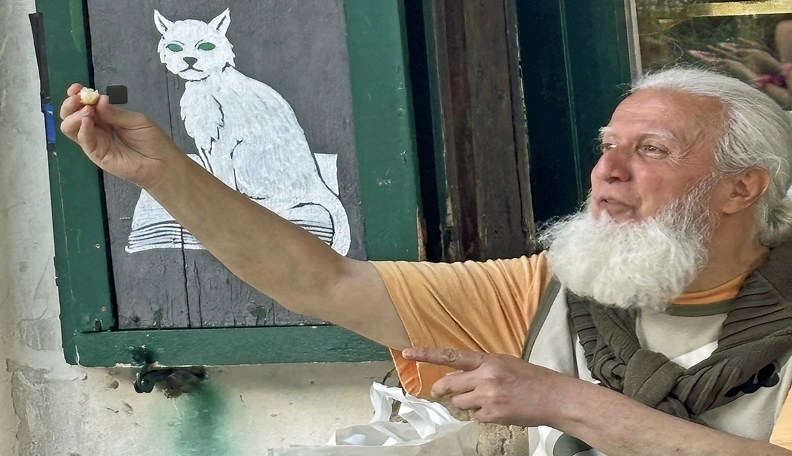
(Photo by Elizabeth Katherine Froese)
A man feeding birds in front of a bookstore, Shakespeare and Company, in Paris.
(The Hamilton Spectator – Saturday, July 13, 2024)
There are few things as enjoyable to me as a good photograph, especially in summer.
My eldest recently brought back a fine photo from Paris. She was visiting a childhood friend, a British girl she knew while growing up in Uganda. So there he is, this photographed gentleman, an older Parisian who looks something like a French Santa Claus, sitting outside a bookstore along the banks of the Seine, feeding the birds.
Of course, we’ve largely lost our relationship with the animals, and rarely take lasting notice of the birds. Maybe they don’t pay much attention to us either. Anyone who’s flown in a plane realizes how inconsequential things below can seem, those little toy cars down there.
But in the gentle morning light, sitting out front by our gnarly willow tree, with my coffee and reading and bare feet, I do better appreciate the song sparrows and jays and such feathered lovies.
I recently captured a photo of one little winged darling feeding behind our house. There we have an old wooden bird cage, transformed into a feeder by way of its always open door. Salvaged from accumulations of the house where I grew up, which recently sold, the antiquated cage is probably older than I am.
When I was a boy we had no birds. Who did? We had cats. Blackie and Fluffy even made our annual Christmas photos. That’s gracious familial acceptance considering they’d sometimes drag animals, like birds, into the house.
There’s a good argument to mind your business and let nature do what it will with these predator-prey activities. And here, funny enough, behind our Parisian man at that bookstore – it’s called Shakespeare and Company – is a significant illustration of a cat.
Yes, birds have their vulnerabilities. As we all do. This is the uncomfortable truth. We too are fragile. And dependent. And mortal. You. Me. Any old bird. Any young bird. It’s one lesson from all this. Even if human life isn’t commonly brutish anymore, it’s still short.
Jesus once said that even a tiny sparrow won’t fall to the ground without its maker knowing. It sounds reassuring enough, even if it’s hard to grasp considering the general callousness of our world. A teachable spirit, I suppose, helps.
Richard Bach’s classic bestseller “Jonathan Livingston Seagull,” explores this. In a world where you can be anything, for heaven’s sake just be yourself. This is what Jonathan, the bird, learned. In time, with much practice, he perfected his flying. Other birds floundered. So they called him both a god and devil. In either case, Jonathan had a teachable spirit.
The average lifespan of a gull, by the way, is about 20 years. A larger bird of prey like a hawk might live twice that long. But singing sparrows? Two to five years. Robins even less.
My daughter’s trip to Paris was her first solo flight. I realize this isn’t the world’s biggest news. But, speaking of teachable spirits, for a student working and planning, it shows there can be a certain pleasure in aging even when you’re young.
Some people are late bloomers. This too is fine. Copernicus developed his theory of planetary motion in his 60s. Colonel Harland Sanders was in his 60s when he got KFC going. This too is good to consider on a relaxed summer weekend for a photo-loving columnist who turns a year older tomorrow, July 14.
Tomorrow is also Bastille Day, the day the French Revolution began when that Paris prison was stormed. That led to both horrible bloodshed and new thinking that helped reshape western culture. You have to wonder what those birds were thinking then, circling history and scenes only they know.
But in case you’re wondering about the birds of Paris in 2024, my daughter tells me that some did eat from this extended, loving hand. Any of us could do worse.

Happy birthday Thomas!